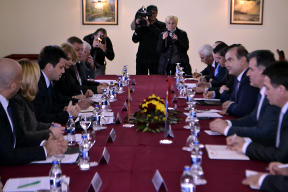Albania, Macedonia and Kosovo officials met in Ohrid to jumpstart transportation infrastructure projects. [Miki Trajkovski/SETimes]

Albania, Macedonia and Kosovo are working on transportation infrastructure projects to improve travel and develop local economies.
Transportation and infrastructure officials met in Ohrid last month and agreed to begin implementing highway projects beginning in the first quarter of this year to connect the three countries. They also agreed to finish construction of the railway along east-west European transportation corridor No. 8 as well as liberalise freight transportation.
“We are beginning to intensify the co-operation process aimed to fully implement all projects and available funds. The process is open to all regional countries because they are involved in European integration,” said Albania Transportation and Infrastructure Minister Edmond Haxhinasto.
Haxhinasto said the meetings have a specific platform and are structured to solve current problems and to look to the future.
Albania announced capital road infrastructure projects to build highways to significantly ease transportation with Macedonia and Kosovo.
Macedonian officials said the country will begin to build two highways in its western part adjacent Albania and Kosovo, while concurrently working on completing the highway to Greece.
“I already announced the signing of the agreement to construct the Kicevo-Ohrid highway — works will begin in the first trimester of 2014 — and also the Macedonian government is making efforts to obtain a favourable financial package for the Gostivar-Kicevo highway. In addition, I announced our plans to rehabilitate the road toward Debar [on the Albanian border],” Mile Janakieski, Macedonia transportation and communications minister, said.
Kosovo has completed highway No. 6, which connects Kosovo with the north-south transportation corridor No. 10, Fehmi Mujota, Kosovo infrastructure minister, said.
“We are about to begin construction on the new highway to the Macedonian border and expect to complete it in three years,” Mujota said.
Mujota said work will likely continue across the border in Macedonia to connect this highway with the Tetovo-Gostivar-Kicevo highway.
“Only this [completed] route will make corridor No. 8 functional,” he added.
“We will continue to contribute to [develop] the east-west transportation corridor No. 8 [because] connecting Tirana and Skopje is very important,” Haxhinasto added.
Completing the road infrastructure means an increase in trade between the three states, and Macedonian companies will begin more readily to use ports in Albania as an alternative to the port in Thessaloniki, said Menderes Kuci, president of the Chamber of Commerce of Northwest Macedonia in Tetovo.
“We expect all the negotiations and agreements will be implemented [soon]. That will have a very positive effect on the economies and state budgets. If our products go through the Albanian ports, then they will more easily reach the far-away Chinese markets,” Kuci told SETimes.
Experts said once the highway in Macedonia leading to the Albanian border is completed, travellers will reach Tirana in two hours and the port of Durres in three hours.
“That will allow us businesspeople to more easily reach the Albanian coast, but also Montenegro, even Kosovo,” Mendi Kira, owner of the Trim and Ljum construction company in Struga, told SETimes.
Overtaken from SETimes.com
